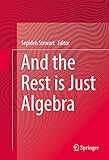And the Rest is Just Algebra [electronic resource] / edited by Sepideh Stewart.
Material type: TextPublisher: Cham : Springer International Publishing : Imprint: Springer, 2017Description: XX, 238 p. 92 illus., 22 illus. in color. online resourceContent type: text Media type: computer Carrier type: online resourceISBN: 9783319450537Subject(s): Education | Mathematics -- Study and teaching | Education | Mathematics Education | Learning & InstructionAdditional physical formats: Printed edition:: No titleDDC classification: 370 LOC classification: LC8-6691Online resources: e-book Full-text access
TextPublisher: Cham : Springer International Publishing : Imprint: Springer, 2017Description: XX, 238 p. 92 illus., 22 illus. in color. online resourceContent type: text Media type: computer Carrier type: online resourceISBN: 9783319450537Subject(s): Education | Mathematics -- Study and teaching | Education | Mathematics Education | Learning & InstructionAdditional physical formats: Printed edition:: No titleDDC classification: 370 LOC classification: LC8-6691Online resources: e-book Full-text access | Item type | Current library | Collection | Call number | Copy number | Status | Notes | Date due | Barcode |
|---|---|---|---|---|---|---|---|---|
| E-Books | MEF eKitap Kütüphanesi | Springer Nature | LC8 -6691 (Browse shelf (Opens below)) | Available | NATURE | 1419704-1001 |
Browsing MEF eKitap Kütüphanesi shelves Close shelf browser (Hides shelf browser)
Operation Algebra: Investigating University Students' Inadequacies -- Student Conceptions in Two-Year College Algebra Courses -- Rational Number Fluency Supports Student Success in Algebra -- Long Term Effects of Sense Making and Anxiety in Algebra -- Algebra as Part of an Integrated High School Curriculum -- Overcoming the Algebra Barrier: Being Particular about the General, and Generally Looking Beyond the Particular -- Teaching and Learning Middle School Algebra: Valuable Lessons from the History of Mathematics -- Cognitive Neuroscience and Algebra -- Valuable Lessons from the History of Mathematics -- Cognitive Neuroscience and Algebra -- Rethinking Algebra: A Versatile Approach Integrating Digital Technology -- Learning Linear Algebra by Using It -- School Algebra to Linear Algebra: Advance from the Symbolic to Formal World of Mathematical Thinking.
This book addresses college students' weak foundation in algebra, its causes, and potential solutions to improve their long-term success and understanding in mathematics as a whole. The authors, who are experts in a wide variety of fields, emphasize that these difficulties are more complex than just forgotten rules, and offer strategic approaches from a number of angles that will increase the chances of student understanding. Instructors who are frustrated with their students' lack of skills and knowledge at college level will find this volume helpful, as the authors confront the deeper reasons why students have difficulties with Algebra and reveal how to remedy the issue. Middle school, college algebra, calculus, and linear algebra teachers can all benefit from this book. Becoming proficient with algebra is a complex task-much more so than it appears to those who were successful the first time around. Furthermore, according to neuroscience studies, manipulating s ymbolic expressions requires considerable cognitive effort even for those who are proficient. In addition, 'met-befores' in the form of prior arithmetic thinking can thwart algebraic thinking. All this, and more, is considered in a readable way in this book. Annie Selden.
5







